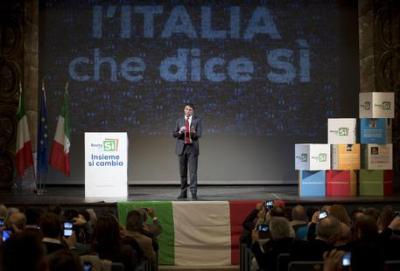Renzi in Campania for ‘yes’ votes

NAPLES -- Prime Minister Matteo Renzi dedicated much of last weekend to the Campania region as the national referendum vote approaches.
With voters going to the polls Dec. 4, the Democratic Party leader continued campaigning for “yes” votes both in Caserta and Benevento Saturday.
Before making his way to the ruins of Herculaneum on the following afternoon, Italy’s leader appeared on national TV in an hour debate with FIOM (Federazione Impiegati Operai Metallurgici) Union leader Maurizio Landini broadcasted on In mezz’ora conducted by journalist Lucia Annunziata.
In a very tense confrontation, the worker union general secretary made it clear that the National CGIL Workers’ Union was against the referendum by explaining, “the union agrees the country needs changes, but we believe in change for the better not just changing things for the sake of it.” He further emphasized, “you’ve got nice titles to vote on like ‘cutting costs’ and ‘reducing politicians,’ the problem is how the changes would come about.”
While defending his ‘sì’ position, the prime minister respectfully accused the union representative of not having read the reform, stating “we need to change things, not defend the ruling class like you are doing.”
“That’s not true,” rebuked Landini. “The union was all for a real independent Senate, but the reform makes it unclear if it would be elected. I’m always against overlapping jobs and I cannot understand how you can be a mayor or councillor and be a senator at the same time. This reform is poorly done.”
Sunday afternoon, Renzi arrived at MAV (Virtual Archaeological Museum) in Herculaneum where he participated in a public discussion before the upcoming referendum vote.
Renzi addressed the packed audience about the turn around of Pompei and Herculaneum that have now become reasons for national pride. “We have reached three million visitors here,” he said, adding “and were still investing.”
In continued defence of the government stance against European austerity, he stated, “The relationship with Europe needs changing because the stability of our children is more important than the European economic stability pact.”
“Over these days we have presented positive economic data, but when I come here to the south, I run into trouble,” the politician went on to say. “There’s a difference between the north and the south; there are regions that continue suffering deeply from the unemployment crisis, but I’m here today to say that together we can change. The country can change if the south changes.”
Before concluding, the leader also dedicated some words to the Five Star opposition movement, highlighting their most recent troubles. “ They were the first to criticise the system. Interestingly, once they get in public office, they become worse than others. When they are out on the street they cry out for honesty. Then, they get in and we find out they copy signatures and forge them. Every other day, they are moralists: if others receive a notice of investigationthey say the politicians are infamous, sold out, part of the mafia; if it happens to one of their guys, then it’s ‘poor thing,’ ‘he made a mistake’ and there’s presumption of innocence. Their behaviour is incomprehensible”.
In the meantime, the world is watching with great anxiety. The democratic decision in Great Britain to leave the European Union and the unexpected result of the US presidential elections have brought on tension as to the possible consequences of the referendum.
Both the Financial Times and the Wall Street Journal have kept the spotlight on the importance of the December vote by publishing articles this week concerning the possible political and economic consequences of the Italian constitutional referendum, highlighting the risks the nation faces in possibly leaving the euro, which many deem a disaster for the old continent.
nkd-fb


